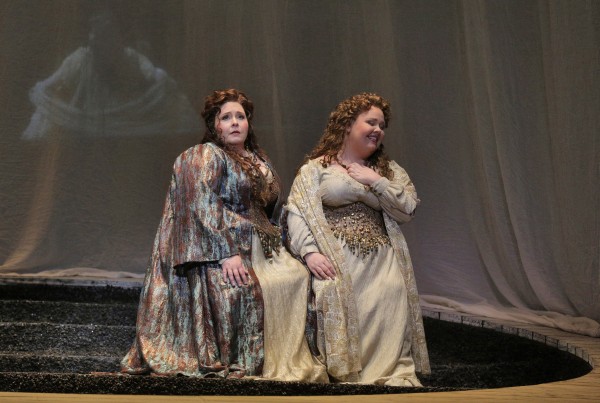Norma, the 1831 opera by Vincenzo Bellini, premiered at the Dorothy Chandler Pavilion November 21, in a new production directed by Anne Bogart, conducted by James Conlon, LA Opera Music Director. Five more performances are scheduled between November 29 and December 13.

Norma (soprano Angela Meade) is the High Priestess of the Druids, in Gaul (France), under occupation by the Roman Army around 50 BC. She is the daughter of Oroveso (bass Morris Robinson), military leader of her people, and she is a soothsayer who interprets the will of the moon Goddess Irminsul. While her oppressed countrymen plan an insurrection against the foreign invaders, she restrains them, telling them the right time has not yet come. Norma has a secret, she is love with the Roman proconsul Pollione (tenor Russell Thomas) and has born him two children, a boy and a girl. When she finds out that her unfaithful lover has wooed another virginal young priestess, Adalgisa (mezzo-soprano Jamie Barton), and plans to take her back to Rome to be his wife, she is furious and considers murdering their children with a knife while they’re asleep, so they won’t become slaves under a stepmother, but cannot bring herself to do it. The two wronged women confide in each other, they embrace and promise to be friends forever, in a moving duet. When Pollione attempts to abduct Adalgisa from the temple against her will, he is arrested. Rather than accusing her rival, Norma confesses that the priestess who has broken the sacred vows of chastity and betrayed her country is herself; after begging her father’s forgiveness and entrusting her children to his care, she is burnt on the funeral pyre as a sacrifice to the Goddess, along with her lover, who finally realizes, too late, what a noble woman she is.
Bellini (born in Catania, Sicily, November 3, 1801, died September 23, 1835), a child prodigy raised in a musical family, like Mozart, is one of the three Italian opera composers who perfected the bel canto vocal style for the soprano singing voice, following in the footsteps of Gioachino Rossini (born in 1792) and Gaetano Donizetti (born in 1797). After his successful opera La Sonnanbula premiered in Milano on March 6, 1831, Bellini immediately sought to write another for his favorite soprano Giuditta Pasta; with his librettist Felice Romani, he chose the French play Norma or the Infanticide by Alexandre Soumet, first performed in Paris in April 1831, as the basis for his Norma, that premiered at La Scala in Milano on December 26, 1831.
The story of Norma bears a strong resemblance to the ancient myth of Medea, as told in the classic Greek tragedy written by Euripides in 431 BC. Medea, a barbarian sorceress married to the mythological hero Jason, leader of the Argonauts, was priestess of the Goddess Hecate and daughter of the King of Colchis; she had fallen in love with Jason and helped him steal her father’s golden fleece and slay the dragon that guarded it. When her unfaithful husband plans to marry Glauce, young daughter of Creon, the king of Corinth, and send his old wife into exile, Medea exacts a terrible revenge. She gifts a poisonous golden robe to the new bride, who is burnt to death with her father, while he’s trying to save her; then kills her two young sons with a knife, before escaping to Athens with their bodies in the golden chariot of the sun god Helios.
This mythical story had been retold in a French opera, Médée composed by Luigi Cherubini in 1797, so it was part of the repertoire known to the young composer Bellini, who died of a peritonitis at age 33, after his last opera, I Puritani, premiered in Paris on January 24, 1835. He only composed 11 operas, but his beautiful lyrical melodramas endured; they were admired and imitated by Giuseppe Verdi, who praised the broad curves of his melodies, and by Richard Wagner, who in 1837 conducted Norma, and wrote an essay about Bellini, the “gentle Sicilian.”
In the 1950s, when the bel canto style underwent a revival, Greek soprano Maria Callas made Norma her signature role with 89 performance between 1948 and 1956. Watch her sing the famous aria Casta Diva (Chaste Goddess) in a 1958 Paris recital. Callas also frequently performed Medea by Cherubini in its Italian version, between 1953 and 1962. That is why her admirer, Italian film director and opera lover Pier Paolo Pasolini, convinced her to star in his 1969 movie version of Medea.
